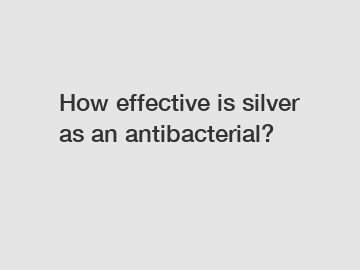Feb. 09, 2024
Chemicals
Ruisen Product Page
In an age where hygiene and health are paramount, the discovery and effective utilization of antibacterial agents have revolutionized medical practices. Among the myriad of options available, silver has stood the test of time as a powerful antibacterial solution. But just how effective is silver as an antibacterial agent? In this article, we will delve into the depths of this fascinating element, exploring its magical properties, historical significance, and modern applications.
Revisiting History:

The usage of silver as a healing agent can be traced back to ancient civilizations such as Egypt, Greece, and Rome. Historical records indicate that silver containers were used to store liquids to prevent bacterial growth. Long before the existence of modern medicine, silver was highly revered for its remarkable antibacterial properties. Even in times when the science behind its effectiveness was unknown, silver played an integral role in promoting health and maintaining cleanliness.
Silver's Mechanism of Action:
At the heart of silver's antibacterial effectiveness lies its ability to disrupt the vital processes of bacterial cells. Silver ions possess a unique affinity for thiol groups, which are present in various enzymes essential for bacterial metabolism. By binding to these enzymes, silver effectively disrupts their functions, rendering the bacteria unable to multiply and causing its eventual demise. Moreover, studies have shown that silver ions can penetrate the cell walls, leading to structural damage and cell death.
Modern Applications:
Silver's impressive antibacterial prowess finds its application in a wide array of settings. In healthcare, silver-coated medical devices, wound dressings, and bandages are widely utilized to prevent infections and promote healing, particularly in cases where antibiotics might be inadequate or inadvisable due to drug resistance concerns. Silver nanoparticles, thanks to their significant surface area, have also shown promise in combating multidrug-resistant bacteria.
Beyond the healthcare sector, silver's antibacterial properties extend into other realms as well. Silver-infused textiles, known as "smart fabrics," are increasingly being used in clothing, bedding, and even face masks to inhibit bacterial growth and maintain cleanliness. The versatility of silver as an antibacterial agent opens up possibilities across industries, from water purification systems to food storage.
Value and Limitations:
While silver undeniably offers numerous antibacterial benefits, it is essential to understand its limitations as well. As with any antibacterial agent, overuse and misuse can lead to the emergence of resistant strains. This highlights the importance of responsible use and adhering to recommended dosages and guidelines. Additionally, the concentration and size of silver particles influence its efficacy, emphasizing the need for thorough research and standardization.
The Future of Silver:
Advancements in nanotechnology and materials science have opened up exciting avenues for exploring silver's antibacterial potential further. Researchers are continually striving to enhance silver's efficacy, reduce costs, and discover innovative ways to utilize its remarkable properties. Collaborative efforts are also underway to combat the growing threat of antibiotic resistance by incorporating silver into hybrid therapies.
Conclusion:
Silver has long held a place of honor in the realm of antibacterial agents, its efficacy rivaling even the most powerful antibiotics. With a rich historical background and ample scientific evidence supporting its effectiveness, silver's antibacterial prowess continues to stand the test of time. As we navigate an era fraught with antibiotic-resistant bacteria, silver's versatility and potential offer a glimmer of hope, paving the way for a future where this elemental warrior might play an even more significant role in our battle against infectious diseases.
Disclaimer: This article is for informational purposes only and should not be considered medical advice. Always consult with a healthcare professional before using any antibacterial or medical product.
Please visit our website for more information on this topic.
If you are looking for more details, kindly visit nano silver powder.
If you are interested in sending in a Guest Blogger Submission,welcome to write for us!
All Comments ( 0 )